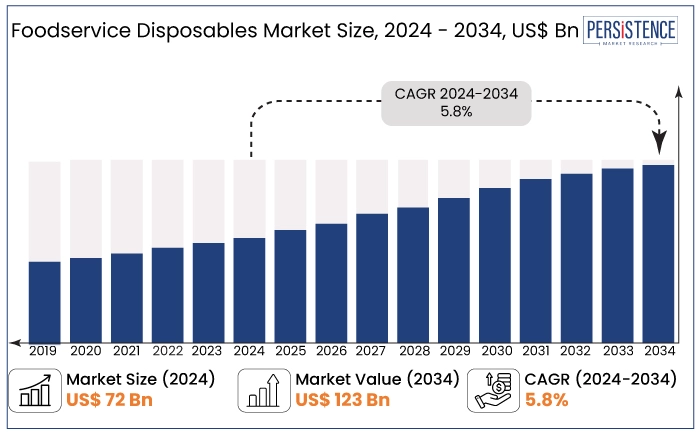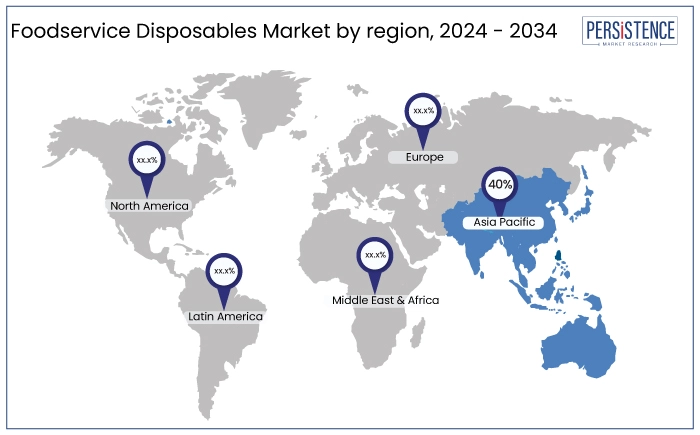Industry: Consumer Goods
Published Date: July-2024
Format: PPT*, PDF, EXCEL
Delivery Timelines: Contact Sales
Number of Pages: 156
Report ID: PMRREP3484
The market is estimated to reach a valuation of US$123 Bn by the year 2034, at a CAGR of 5.8%, during the forecast period 2024 to 2034.

Key Highlights of the Market
|
Attributes |
Key Insights |
|
Market Size (2024) |
US$72 Bn |
|
Market Size (2034) |
US$123 Bn |
|
Forecast Growth Rate (CAGR 2024 to 2034) |
5.8% |
|
Historical Growth Rate (CAGR 2019 to 2023) |
4.8% |
The market is witnessing impressive growth during the forecast period. The growth of online sales channels and apps for food delivery services is resulting in the growing demand for foodservice disposables like cups, plates, and containers.
The trend of delivering food at home or any place by order is contributing to the growth of the foodservice disposables.
Moreover, increasing concern among environmentalists about plastic-based products is also resulting in the wide usage of recyclable plastic for making plastic-based foodservice disposables.
It also helps in managing waste, the majority of the companies along with the production of foodservice disposables have also started recycling foodservice disposables made using plastic.
Foodservice providers are also using recycled packaging materials including cups, trays, wraps, plates, etc. Manufacturers have also started producing disposable products using pulp, and plant fiber. This is resulting in the growth of the biodegradable foodservice disposables.
Companies are also focusing on offering food products in customized packages with customized prints on them. For making customized disposables, foodservice providers are using UV-cured ink as it contains no or little VOC that can be harmful to the environment and humans.
The growing number of quick service restaurants is the growing trend in the market that is aiding the growth of the foodservice disposables market.
Over the past few years, there have been substantial developments in the food industry. Customers now depend more on online delivery platforms that follow all safety regulations, beginning with preparation, packaging, and delivery, as a result of the COVID-19 epidemic.
Cloud Kitchens are starting to appear in areas where delivery services enable them to establish a successful market without having to make infrastructure investments for dine-in services.
With changes in lifestyle, food packaging trends are changing quickly, and online meal delivery apps are becoming more important to food distribution channels. The foodservice packaging market is driven by the rising working class and the appeal of the typical fast-food meal.
The foodservice disposables market has seen consistent growth in recent years, driven by several key factors. While specific historical figures can vary depending on the research source, the overall trend in the market is clear that convenience reigns supreme.
The global market reached a size of USD 28 billion in 2023, with a growth rate of 4.8% during the historical period 2019 to 2023.
Compared to paper, paperboard and aluminium, plastics are likely to emerge as one of the highly preferred raw materials for foodservice disposables. Manufacturers of foodservice disposables are focusing on using recyclable plastics.
Moreover, the government of different countries are introducing stringent regulations on using plastic as it is not eco-friendly and takes a very long time to decompose, thereby harming the environment, which has made the market for market exhibit a substantial growth rate.
Growing Need for Convenient Food Serving
The need for foodservice disposables is driven by the importance of convenience and hygiene in the foodservice sector.
Serving food and beverages with disposable plates, cups, utensils, and containers is a practical and hygienic alternative.
In hectic kitchen settings, they save time and labor expenses by doing away with the need to wash dishes and silverware.
Furthermore, foodservice disposables fulfil strict hygiene standards by guaranteeing cleanliness and reducing the possibility of cross-contamination.
The industry's widespread adoption of foodservice disposables is mostly due to their convenience and hygiene, as food safety and customer satisfaction become more and more important considerations.
Expansion of the Catering Sector
Foodservice disposables are in high demand because of the ease and adaptability they provide, which is driven by the growing catering and event management industries.
To easily serve big groups of visitors, catering firms and event planners use disposable plates, utensils, cups, and serving trays. By making setup, serving, and cleanup easier, these disposables help catering workers save time and money on labor.
Disposable dinnerware also guarantees that cleanliness and hygiene regulations are fulfilled, which is important for gatherings when food is served to a varied crowd of guests. The use of foodservice disposables in the event management sector is fueled by the rising demand for catering services.
Evolving Consumer Lifestyles
Foodservice disposables are becoming increasingly popular due to shifting eating and lifestyle patterns.
People are moving toward quick meals and on-the-go dining options as they lead busier lifestyles and want convenience. When having meals away from home at work, school, or during leisure activities foodservice disposables offer a practical alternative.
Furthermore, the popularity of outdoor events and casual meals promotes the usage of throwaway tableware at social gatherings like barbecues and picnics.
The market for foodservice disposables is driven by consumers' shifting preferences for flexible and convenient dining schedules as a workable answer for contemporary lifestyles.
Price Sensitivity
The foodservice disposables business faces a challenge from price sensitivity in cost-conscious regions.
Paying more for disposable goods is met with reluctance in areas where cost is a top priority for consumers. Despite its advantages for the environment, this price sensitivity restricts the market potential for more expensive eco-friendly or biodegradable alternatives.
Furthermore, consumers on a tight budget can choose less expensive, inferior disposables, which would reduce the income potential for producers of superior goods.
For food service disposables firms competing in price-sensitive marketplaces, striking a balance between cost, quality, and sustainability continues to be a major problem. To be competitive, these companies need to develop creative pricing strategies and product offerings.
New Product Launches
Major market manufacturers have developed cutting-edge, 100% biodegradable goods that are waste-free and have minimal impact on the environment.
Due to their 100% recyclable nature, dry leaves have become increasingly popular worldwide. Indian companies have long been the industry leaders in producing dry leaf pate and bowls.
The introduction of new products made of various materials has significantly altered the market and is assisting it in weathering a difficult period.
One of the major manufacturers in the foodservice disposables market has developed wheat trays, cups, glasses, spoons, and other disposable foodservice items. Most of these offerings are completely biodegradable and require very little water or other natural resources to manufacture, making them safe for ingestion by humans and environmentally beneficial.
With this, the market offers a lucrative opportunity to grow in the said market segment and launch cutting edge products to compete against the major competitors in the global market.
Rigid Packaging Dominates with 75% Market Share
|
Market Segment by Packaging Type |
Market Value Share 2023 |
|
Rigid |
75% |
Based on packaging type, the foodservice disposables market is further divided into rigid and flexible, where the rigid packaging segment owns the major market share accounting for around 75% of the total market share in the packaging type segmentation.
The primary purposes of rigid packaging are to keep food from spilling and to make things easier for customers. Foodservice providers utilize a range of rigid packaging based on the food's temperature, quantity, and material condition.
Plates and containers, bowls and tubs, mugs and saucers, lids, and other disposables are all included in the rigid packaging category. Rigid items made of plastic are expected to expand significantly.
Foodservice Sector Consumes 52% of Disposables
|
Market Segment by Application |
Market Value Share 2023 |
|
Food Service |
52% |
Based on application segment, the market is further classified into food service and online application, where the food service segment dominates the market with 52% of the market share.
The market is anticipated to expand as a result of the fast-changing dynamics of the food service sector.
Further, the market will rise as takeout and online meal delivery services become more and more popular. The sector has undergone changes since the lockout, which has resulted in a greater reliance on disposables for both dine-in and online meal delivery applications.
All different types of foodservice providers have seen an increase in demand for food service disposables as a result, and this trend is anticipated to continue in the years to come.
Asia Pacific Leads the Global Market with 40% Revenue Share
|
Region |
Market Value Share 2023 |
|
Asia Pacific |
40% |
Asia Pacific held the largest revenue share of around 40%, dominating the global foodservice disposables market.
The presence of the fastest-growing economies and a thriving food service industry is expected to propel the regional market's expansion at a rapid CAGR from 2024 to 2034.
Due to its high fast-food restaurant density and growing adoption of online meal delivery services, China is expected to continue to be the greatest contributor and hold the top spot in the regional market during the forecast period.
Further, the European region is estimated to have a steady growth rate during the forecast period 2024 to 2034. Over the course of the projection period, the strict laws regarding the usage of single-use plastic and plastic tableware are anticipated to exacerbate the market's slow growth.
Future market expansion in the European region is probably going to be hampered by these strict limitations. However, in light of these changes, it is projected that Europe will see a notable increase in demand for alternatives based on paper.

December 2023
BradyIFS + Envoy Solutions, a distributor of JanSan, foodservice and packaging supplies, acquired PFS Sales Company. The deal marked an important acquisition in the wholesale distribution industry. The latter distributes foodservice disposables, and cleaning supplies and the deal is likely to strengthen the former’s presence in the Carolinas, and the Southeast.
August 2023
Colliers International, a South Carolina commercial real estate firm, leased 55,000 square feet of warehouse space to Elara Foodservice Disposables. This indicates Elara Foodservice Disposables is expanding its operations in South Carolina, likely to store and distribute foodservice disposables.
December 2022
Beery Global, a leading competitor in the market announced to set up an internal material testing facility to innovate food packaging solutions.
June 2022
The Central Government of India announced a ban on single-use plastic in the country which prompted hawkers and street vendors to find new alternatives, which eventually aided the market growth.
|
Attributes |
Details |
|
Forecast Period |
2024 - 2034 |
|
Historical Data Available for |
2019 - 2023 |
|
Market Analysis |
US$ Billion for Value |
|
Key Regions Covered |
|
|
Key Companies Profiled |
|
|
Pricing |
Available upon request |
By Packaging Type
By Application
By Material
By Region
To know more about delivery timeline for this report Contact Sales

The global foodservice disposables market is estimated to exhibit a CAGR of 5.8% during the forecast period 2024 to 2034.
Asia Pacific is the dominant region with 40% of the global market share in the foodservices disposables market.
Price sensitivity, and supply chain disruptions limit the market’s growth.
The global foodservice disposables market is segmented based on Packaging Type, Application and Material.
Vegware Ltd., Gold Plast SPA., Anchor Packaging Inc., Biopac India Corporation Ltd., Dart Container Corporation, and Berry Global Inc. are some of the key players in the market.